- Home
- David Brin
Brightness Reef u-4 Page 3
Brightness Reef u-4 Read online
Page 3
Chastened by her wisdom, we fell into meditation.
No longer needed, the errant rewq slipped off our brows and gathered in the center, exchanging host-enzymes. We took up a gentle rhythm, each sage adding a line of harmony — of breath and beating hearts.
My rings, do you recall what chose then to occur?
The fabric of our union was ripped by booming echoes, cast arrogantly by the Rothen ship, proclaiming its malign power, before it even arrived.
We emerged to stare, dismayed, at the riven sky.
Soon sage and clanfolk alike knew The Day had finally come.
Vengeance is not spared upon the children of the fallen.
The Family of Nelo
The paper-crafter had three offspring — A number worthy of his noble calling, like his father, I and his father’s father. Nelo always supposed the line would go on through his own two sons and daughter.
So he took it hard when his strong-jawed children deserted the water mill, its sluiceways, and wooden gears. None heeded the beckoning rhythm of the pulping hammer, beating cloth scavenged from all six races, or the sweet mist spread by the sifting screens, or the respectful bows of traders, come from afar to buy Nelo’s sleek white pages.
Oh, Sara, Lark, and Dwer were happy to use paper!
Dwer, the youngest, wrapped it around arrowheads and lures for the hunt. Sometimes he paid his father in piu nodules, or grwon teeth, before fading into the forest again, as he had done since turning nine. Apprenticed to Fallon the Tracker, Dwer soon became a legend across the Slope. Nothing he sought escaped his bow, unless it was shielded by law. And rumors said the fierce-eyed lad with jet-black hair killed and ate whatever he liked, when the law wasn’t looking.
As focused as Dwer was wild, Lark used paper to plot vast charts on his study wall, some parts almost black with notes and diagrams. Elsewhere, large spaces gaped blank, a waste of Nelo’s art.
“It can’t be helped, Father,” Lark explained near wooden shelves filled with fossils. “We haven’t found which species fill those gaps. This world is so complex, I doubt even the Buyur ever fully grasped Jijo’s ecosystem.”
Nelo recalled thinking that an absurd thing to say. When the Buyur leased Jijo, they had been full citizens of the Community of the Five Galaxies, with access to the fabled Great Library, dwarfing all the paper books in Biblos! With a word, the Buyur could beckon any answer under the sun. Under a billion suns, if tales of the past could be trusted.
At least the sages approved of Lark’s work. But what of Sara? Always Nelo’s favorite, she used to love the smells, rhythms and textures of papermaking — till age fourteen, when she stumbled on a talent.
Nelo blamed his late wife, who had entered his life so strangely, long ago, and used to fill the kids’ heads with odd tales and ambitions.
Yes, he decided. It was all Melina’s fault—
A low cough jarred Nelo’s drifting resentment. He blinked as a pair of deep brown eyes peered over his pitted desk. Dark fur framed a face so nearly human that unwary traeki sometimes gave chimpanzees the courtesy due full members of the Commons.
“Are you still here?” Nelo snapped.
The face winced, then nodded to the left, toward the paper storeroom, where one of Nelo’s aides slowly gathered torn sheets from a discard bin.
He cursed. “Not that garbage, Jocko!”
“But Master, you said to fetch waste scraps we can’t sell—”
Nelo ducked under the Great Shaft, a rotating horizontal shank of hardwood, carrying power from the village dam to nearby workshops. He shooed Jocko away. “Never mind what I said. Go back to the vats-and tell Caleb to put less water through the millrace! It’s four months till rainy season. He’ll have us out of business in two!”
Nelo scanned the shelves for himself, finally choosing two reams of slightly flawed sheets, bound in liana vines. They weren’t quite rejects. Someone might have paid cash for them. On the other hand, what was there to save for? Didn’t the sages warn against investing much pride or care in tomorrow?
For all strivings will be judged, and few will win grace…
Nelo snorted. He wasn’t a religious man. He made paper. The profession implied some faith in the essential goodness of time.
“These’ll do for your mistress, Prity,” he told the little chimp, who rounded the desk, holding out both hands. Mute as a rewq, she served Nelo’s daughter in ways no other being on Jijo could manage. Ways that few could comprehend. He handed over one of the heavy packages.
“I’ll carry the other. It’s time I dropped by anyway, to see if Sara’s getting enough to eat.”
Mute or not, the ape was expressive with rolled eyes. She knew this was just an excuse for Nelo to have a look at Sara’s mysterious house-guest.
Nelo growled. “Come along and no dawdling. Some of us work for a living, you know.”
A covered walkway linked the dam/factory to the forest, where most villagers dwelled. Fierce sunlight filtered through a canopy of living camouflage. At noon it took an optimist to think the screen would hide the buildings against a resolute scan from space — and among the Six, optimism was viewed as a mild type of heresy.
Alas, it was not the type of heresy followed by Nelo’s eldest son.
Concealment seemed doubly problematic for the great dam itself. Unlike the ones qheuenish colonists made, bottling small ponds behind barriers that mimicked landslides or piles of logs, this dam spanned half an arrowflight from end to end. False boulders and cascades of melon creepers blurred its outline. Still, many called it the most blatant artifact on the Slope-outside of some ancient Buyur site. Each year, on Denouncement Day, radicals harangued for its destruction.
And now Lark is one of them. Nelo cast a stock complaint toward his dead wife’s spirit. Do you hear, Melina? You brought the boy with you, when you came from the far south. We’re taught genes don’t matter as much as upbringing, but did I raise a son to be a rabble-rousing apostate? Never!
Instead of camouflage, Nelo put his faith in the promise of the founding ancestors who planted their truant seed on Jijo, claiming there would be no determined scan from space. Not for half a million years or so.
He once stressed that point in an argument with Lark. To his surprise, the lad agreed, then said it did not matter.
“I urge drastic measures not because I’m afraid of being caught, but because it’s the right thing to do.”
Right? Wrong? A cloud of dizzying abstractions. Lark and Sara kept bringing up such fluff — arguing with each other for miduras about fate and destiny. Sometimes Nelo found Dwer, the wild boy of the forest, the easiest of his children to understand.
The village carpenter’s shop spewed sawdust, making pipe for Jobee, the rotund village plumber, to splice into homes, bringing fresh water and taking away waste to the septic pits. The comforts of a civilized life.
“Deep shade, Nelo,” Jobee drawled in a manner that invited a soul to stop and chat a spell.
“Cloudy sky, Jobee,” Nelo replied with a polite nod, and kept walking. Not that a few duras’ idle banter would hurt. But if he learns I’m visiting Sara, he’ll drop by later with half the town to find out what I learned about her new pet… the stranger with the hole in his head.
Once upon a time, it had been a fallen chipwing with a broken tail rudder, or a wounded toyo pup. Anything sick or hurt used to wind up in his storeroom, where Sara tended it in a box lined with his finest felt. Nelo had figured his adult daughter finally past that phase-till she returned from a routine gleaning trip a few days ago, with a wounded man thrashing on a stretcher.
Once Nelo might have opposed an outsider, even a sick one, lodging in his daughter’s treehouse. Now he was glad to see anything draw her from a year’s hard work and isolation. One of Sara’s guildmasters had written to him recently, complaining that she was shirking a principal duty of a woman of her caste, prompting Nelo to write back, rebuking the fellow’s impudence. Still, any interest Sara showed in a man was cause for
guarded hope.
From the covered walkway, Nelo spied the town exploser and his young son, inspecting an anchor-pier of the great dam. Forbidding and earnest, with deep-chiseled features, Henrik reached into a recessed hole and withdrew a bulb-ended clay tube. Scrutinizing the charge, the exploser held it for his son to sniff.
Nelo was suddenly acutely aware of the mighty lake, lurking behind the dam, ready to sweep away the locks and factories if ever a signal came for Henrik to do his duty. He also felt a pang of jealousy over that knowing tete-a-tete between father and child — the sort that he once had with his own sire. One he hoped to share again, with someone who loved paper as he did.
If only one of the three kids would give me an heir.
I’ll have one yet, he vowed. If I must bribe the sages to command it!
Henrik slipped the tube back inside, resealing the hole with clay.
A low sigh hissed to Nelo’s left, where he saw another person also watching the explosers. Log Biter, matriarch of the local qheuenish hive, squatted by a tree stump with all five legs drawn in. Nervous exhalations stirred dust beneath her blue carapace, and she wore a rewq over her vision strip — as if that would tell her much about Henrik and son!
Anyway, what was Log Biter worried about? Surely this was just routine maintenance. Dole’s human villagers would never sacrifice the dam, source of their wealth and prestige. Only a few orthodox fools wanted that.
And Nelo’s eldest son.
Everyone’s edgy, he thought, turning away. First an abnormal winter, then Ulkoun’s proposition, and Lark’s heresy. And now Sara comes home with a mysterious outsider.
Is it any wonder I have trouble sleeping?
Most villagers’ homes lay safe from the glowering sky, nestled high in the trunks of mighty garu trees, where strains of edible moss flourished on wide branch-top gardens. It seemed a niche made for Earthlings, just as blue qheuens loved lakes, and dry plains suited urrish tribes.
Nelo and Prity had to stop briefly while children herded braying bush-turkeys across the forest loam. A pair of opal-skinned glavers, perturbed while rooting for grubs, lifted their round heads and sniffed haughtily. The children laughed, and the glavers’ bulging eyes soon dimmed, the light of anger costing too much effort to maintain.
It was the familiar rhythm of village life, and Nelo would happily go on taking it for granted, but for his eldest son’s words before leaving for Gathering, when Lark explained the reason for his heresy.
“Nature is taking hold of this world again, Father, moving beyond the patterns imposed by its former tenants.”
Nelo had been doubtful. How could unsapient life change a world in less than a million years? Without a guiding race to tend it, as a farmer manages a garden?
“It’s what declaring a world fallow is all about,” Lark went on. “Letting it rest and recover without interference.”
“Without the likes of us, you mean.”
“That’s right. We aren’t supposed to be on Jijo. We do harm simply living here.”
It was the moral dilemma of the Six. The ancestors of each race had felt they had strong reasons to come so far in sneakships, planting outlaw seed on a forbidden world. The Scrolls spoke of crime blended with desperate hope. But Nelo’s son stressed only the felony. Moreover, Lark and his comrades planned finally doing something about it. A grand gesture at this year’s Gathering, atoning for generations of guilt with an act of devotion, both holy and terrible.
“What foolishness!” Nelo had protested. “When civilization finally resettles this galaxy, there’ll be no sign our kind ever lived here. Not if we live righteously, by Egg and Oath. What you plan will make no difference!”
In any quarrel with Dwer, there would have been defiant shouting. But Lark was even more frustrating to talk to, masking his purist heresy behind an obstinate civility he must have inherited from his mother.
“It doesn’t matter if our crime is never discovered, Father. What matters is we don’t belong here. We simply should not exist.”
Villagers saluted their paper-crafter as Nelo and Prity passed by. But today he only glowered, wishing acridly that his offspring wouldn’t vex him so-first by neglecting his wishes, then by inflicting the ferment of their disturbing ideas.
Several boats lay berthed at the town dock. Nimble, sleek-furred noor beasts scampered across the masts, tending lines and camouflage shrouds, as their kind had been trained to do for centuries by the tall, long-snouted hoon. The crew of one vessel helped some local men load a cargo of glass and metal, scavenged from a Buyur site upriver, destined for reprocessing by the smiths of Ur-Tanj town, or else bound for the dross pits, far out to sea.
Normally, Nelo might have paused to watch, but Prity tugged his sleeve, urging him upward, into the blue-gray branches of the grove.
As they turned, sudden shouts blared. Men dropped their burdens and hoon sailors crouched, splaying shaggy legs. Creaking tree trunks swayed like the ship masts as lines snapped and ripples stitched the water. A cloud of leaves poured from the forest, filling the air with spinning spiral forms. Nelo recognized the basso rumble of a quake! Spine-tingling fear mixed with a strange thrill as he pondered whether to try for open ground.
The tumult passed before he could decide. Branches kept swaying, but the walkway planks ceased vibrating and the watery ripples vanished like dreams. Relieved sailors snorted. Villagers made reverent hand gestures, for Jijo’s flexings were sacred omens of the planet’s healing force, even when they brought riotous ruin. Once, a century ago, a more violent quake had brought forth the Holy Egg, a blessing worth all the pain that accompanied its birth.
Oh, Mother Jijo, Nelo prayed as the last temblors faded. Let things go well at Gathering. Let the sages talk Lark and his friends out of their foolish plan.
And perhaps, he dared add, let Dwer also meet a girl of good family and settle down?
He knew better than to ask a third wish. Sara wouldn’t want him invoking a deity in her favor. Not unless it were Ifni, the impartially capricious goddess of numbers and fate.
When his pulse steadied, Nelo signaled for Prity to lead. Their route now spiraled up a massive garu, then along branch-tops spanned by rope guideways. Nelo’s feet moved by habit and he barely noticed the height, but the bundle of paper grew heavy in his hands.
Sara’s treehouse perched so high that daylight spread for hours across one wattle wall. Nelo gripped a guide-rope while crossing the last stretch. The naked sun was so unsettling, he nearly missed noticing a square-sided cage, made of braced rods, that hung from a pulley next to Sara’s sky porch.
A lift! Why is a lift attached to my daughter’s home?
Then he recalled. It’s because of the Stranger.
Pungent aromas wafted from the house — tart, musty, and sweetly slimy. Peering inside, Nelo made out slanting rays of light, stabbing through louvered blinds. Sara’s voice could be heard, muttering unhappily from another room. His hand raised to knock on the jamb, but paused when a pair of shadows loomed from within — one a cone-shaped outline of circular tubes, taller than Nelo’s head. Nubby feet propelled the bottommost ring, making squishy sounds as it neared.
Two ’roller-hoops framed the smaller creature, whose slim torso ended with a pair of graceful arms and four eye-tipped feelers that peered all ways at once. One wheel squeaked as this entity rolled forward, revealing the spotted brain case and droopy eyestalks of an elderly g’Kek.
If any two citizens of Dolo Village could make Nelo feel spry at his age, it was this pair. In all the life-history of their two species, no g’Kek or traeki had ever climbed a tree.
“Cloudy skies, papermaker,” the wheeled one said.
“Deep shade, Doctor Lorrek. And to you, Pharmacist.” Nelo bowed twice. “How goes your patient?”
Lorrek’s Anglic was superb after years serving Dolo’s mostly human populace.
“Astonishingly, the injured man gains strength, soothed by Pzora’s special unguents” — the doctor bent a stalk
toward the traeki whose ninth torus looked flushed from hard medicinal labor — “and helped by the care he receives in this clean air.”
This was a surprise. The Stranger had seemed a goner.
“But his wounds! The hole in his head—?”
Shrugging had originally been a human gesture, but no one did it with more poise than a g’Kek.
“A fatal mutilation, I feared. Clearly the outlander owes his life to Pzora’s secretions, and your daughter’s swift action, hauling him from that foul swamp.”
The traeki pharmacist then spoke, turning its jewel-like sense organs, its voice wavering like an untuned metal harp.
“i/we help gladly, though our synthesis rings near-swoon from the effort. Unguents of rare potency were needed. Yet it seems difficult to please.”
“How do you mean?”
“Only here, up high where germs are scarce, might the work be done. Miss Sara’s abode is ideal, and she will let no other take the patient. Yet she complains so! Aggrieved, she speaks longingly of an end to her work-disruption. Toward getting us all out of her hair.”
“It’s just a metaphor,” Lorrek explained.
“As i/we assumed. Its paradoxical dissonance we/i esteem highly. May her selves understand that.”
“I’ll see that she does,” Nelo told Pzora, smiling.
“Thank you all, excellent Nelos,” the young traeki responded, slipping into plural form, “i/we hope for serene work, when we return this evening.”
Lorrek wrapped his eyestalks, and Nelo needed no rewq to read the old g’Kek’s silent laughter. “Serenity is good,” he agreed dryly, coughing behind a hand.
He braced the elevator cage, first for the heavy traeki to shuffle aboard. Then Lorrek rolled in, his left wheel wobbling from untreatable degenerative axle disease. Nelo pulled the signal rope, calling an operator far below to start the weight-driven winch.
“Has anything been learned about the Stranger’s identity?” Lorrek asked while waiting.

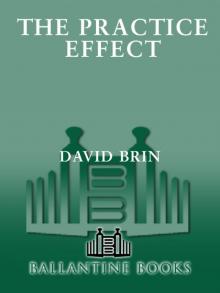 The Practice Effect
The Practice Effect Infinity's Shore
Infinity's Shore Insistence of Vision
Insistence of Vision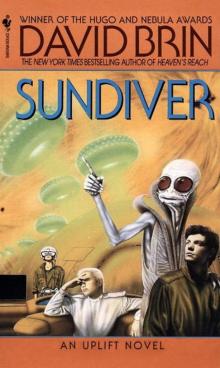 Sundiver
Sundiver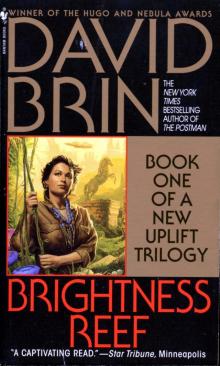 Brightness Reef
Brightness Reef Existence
Existence The Transparent Society
The Transparent Society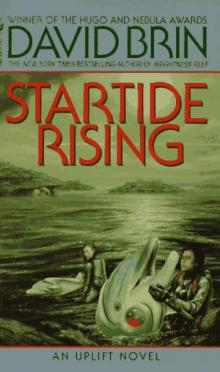 Startide Rising
Startide Rising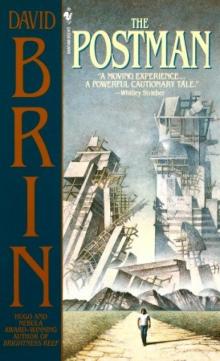 The Postman
The Postman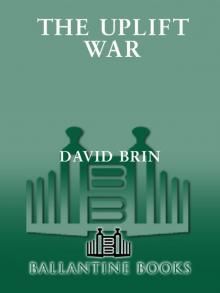 The Uplift War
The Uplift War The Loom of Thessaly
The Loom of Thessaly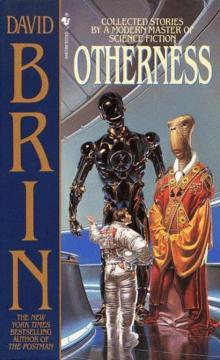 Otherness
Otherness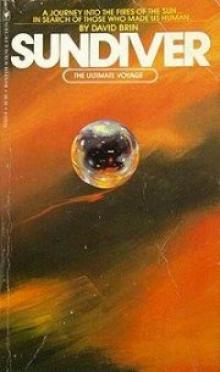 Sundiver u-1
Sundiver u-1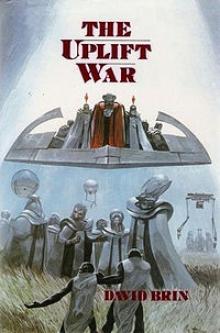 The Uplift War u-3
The Uplift War u-3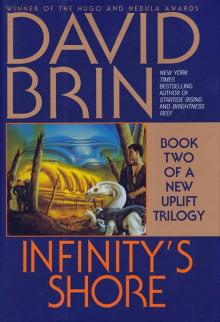 Infinity's Shore u-5
Infinity's Shore u-5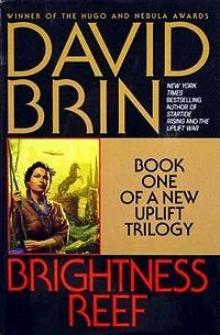 Brightness Reef u-4
Brightness Reef u-4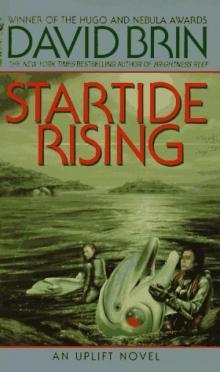 Uplift 2 - Startide Rising
Uplift 2 - Startide Rising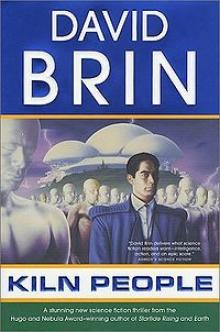 Kiln People
Kiln People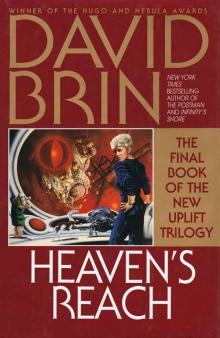 Heaven's Reach u-6
Heaven's Reach u-6 The Transparent Society: Will Technology Force Us to Choose Between Privacy and Freedom?
The Transparent Society: Will Technology Force Us to Choose Between Privacy and Freedom?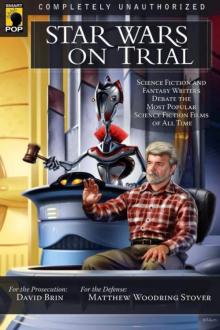 Star Wars on Trial
Star Wars on Trial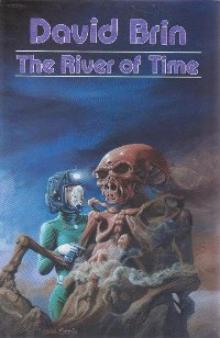 Lungfish
Lungfish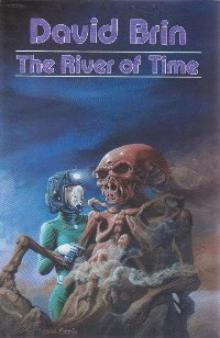 Tank Farm Dynamo
Tank Farm Dynamo Just a Hint
Just a Hint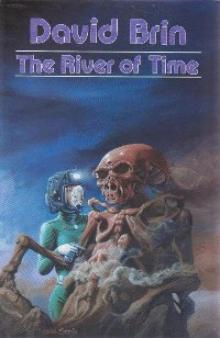 A Stage of Memory
A Stage of Memory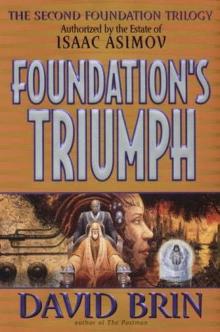 Foundation’s Triumph sf-3
Foundation’s Triumph sf-3 Thor Meets Captain America
Thor Meets Captain America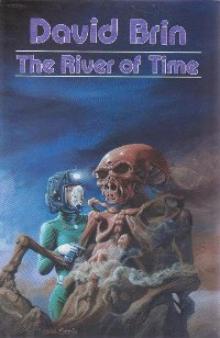 Senses Three and Six
Senses Three and Six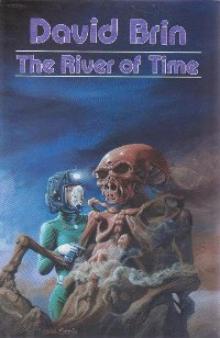 The River of Time
The River of Time Chasing Shadows: Visions of Our Coming Transparent World
Chasing Shadows: Visions of Our Coming Transparent World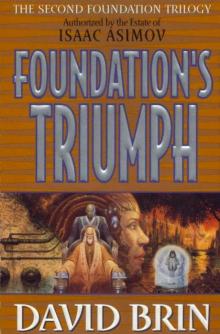 Foundation's Triumph
Foundation's Triumph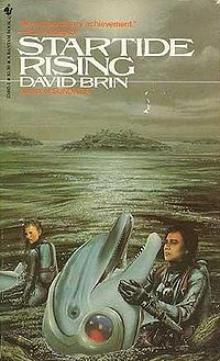 Startide Rising u-2
Startide Rising u-2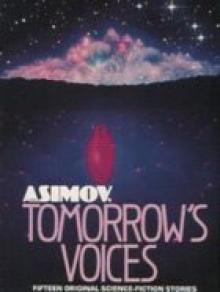 The Fourth Vocation of George Gustaf
The Fourth Vocation of George Gustaf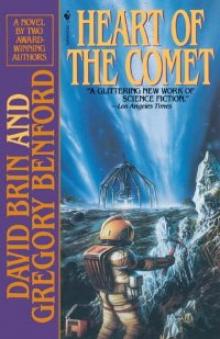 The Heart of the Comet
The Heart of the Comet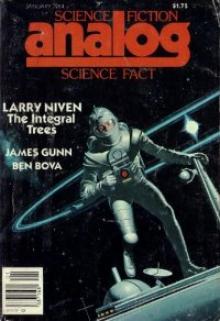 The Crystal Spheres
The Crystal Spheres